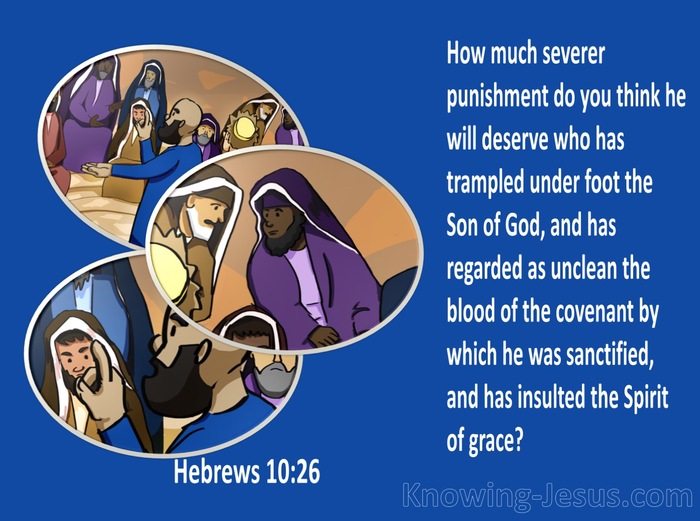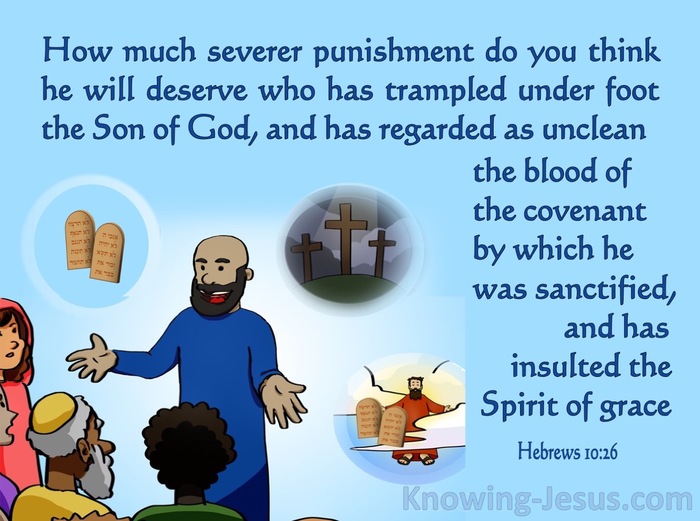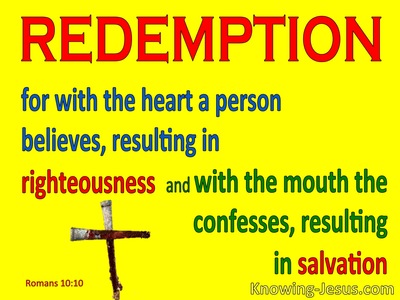◄ What Does Hebrews 10:26 Mean? ►
For if we go on sinning willfully after receiving the knowledge of the truth, there no longer remains a sacrifice for sins,
Hebrews 10:26(NASB)
Verse of the Day
The book of Hebrews was penned before the fall of Jerusalem in 70AD. For about 40 years after Christ's death, the Jewish nation (the Hebrews who rejected the Messiah and crucified the Lord of Glory) continued to participate in all the Jewish rites and rituals in the old covenant. They continued to make sacrificial offerings through the Levitical priesthood, even though Jesus was the full and final sacrificial offering, cutting the new covenant in His blood. They also kept Jewish sabbath days and feast ceremonies, even though the veil of the Temple had been torn from top to bottom. During these 40 years, attempts were made to discredit Christianity and entice Jewish Christians to return to pre-Cross religiosity.
Hebrews was originally written to strengthen the faith of Jewish believers and to warn against drifting away from the truth, neglecting our great salvation, the dangers of unbelief, the hindrances caused by an immature faith, and the foolishness of rejecting God's grace. And there is a serious warning against wilful sinning in chapter 10. Today these passages in Hebrews are often used to teach, incorrectly, that a believer can lose their salvation, but when taken in its correct historical context it becomes clear that the book in general and these passages in particular, need to be understood from the perspective of first-century Jewish believers.
In the early days of the Church, many Jewish Christians who had trusted Christ as their Saviour, were being drawn back into Temple worship, Mosaic observances, and practicing, customs and traditions of the elders, even though they had been replaced when Jesus became the sacrificial Lamb of God, Who takes away the sin of the world.
Hebrews was written to tell Jewish Christians why they had to stop participating in these Old Testament Jewish practices. They had to realise that participating in the prescribed, pre-Cross practices of the old covenant was an affront to God and rebellion against the Lord Who bought them with His precious blood. Peter also writes of those who turn from the revealed truth of Scripture, back to the old ways: "It would be better not to know the way of righteousness, than to know it and then turn their backs on the holy commandment that was committed to them."
Reverting from revealed biblical truth and returning to Old Testament sacrifices and offerings, showed that Christ's sacrificial offering of Himself was futile and meaningless to them. The Mosaic Law and its rites and rituals that were originally commanded by God, pointed to Christ Who fulfilled God's Law on our behalf. The Mosaic Law could identify sin but it could not forgive sin because Christ's shed blood alone is the only sacrifice acceptable to God for the forgiveness of sin. Hebrews explains that to reject the sacrifice of Christ and Scripture's revealed truth, and to return to the old ways (like the temple sacrifices and the sin offering) is rebellion and it is wilful sin. And so in Hebrews 10:26 we read: "For if we go on sinning wilfully after receiving the knowledge of the truth, there no longer remains a sacrifice for sins."
Before the Cross, Israelites could bring a sacrifice to the Temple and have their sins covered. But this continual covering could only last until God's anointed Messiah, the true Lamb of God, would become the final sacrifice for the sin of the world. After the Cross, the old sacrificial system, the Aaronic priesthood, and the many rites, rituals, feasts, and Sabbaths in Judaism, were replaced by a new and better covenant. After the Cross the old way became redundant, so adopting the old form of Temple worship was futile as it could not save nor could it cover sin as had been the case in the past. To hear that the way of righteousness was a gift of God through faith in Christ and then to turn back to a system that was no longer operative, was shocking and futile.
The Person and work of Christ is the heart of the New Testament. We begin our Christian life by getting to know Him as our Saviour, but as we grow in grace and deepen our knowledge of Him, we come to know Him better, to love Him more, and to acknowledge Him as our Lord and our God. Hebrews wanted to warn Jewish Christians against returning to the old ways, but it also is an encouragement to all believers to press on to maturity.
As one reads through Hebrews, we see that the author systematically teaches that the old things have passed away and been replaced with the new, through the God-Man, Jesus Christ the righteous Who is a prophet greater than Moses, a High Priest greater than Aaron, and a King of kings greater than David. At His first coming, Jesus came as God's Prophet. When He returns, He will come back as God's anointed King. But today, the Lord Jesus is acting as God's great High Priest Who ever lives to make intercession for all who are His children.
May we heed the warnings within the pages of Hebrews and refuse to be pressured into any form of legalistic practices. Never forget that we are eternally saved and eternally secure in Christ. Our salvation is secure because of what Christ has done and not due to anything that we have or have not done. We are not only SAVED by grace through faith but we are to LIVE every moment of our lives by grace through faith.
My Prayer
Heavenly Father, thank You for sending Your Son, Jesus Christ, to be my Saviour and Lord. Thank You that He is my Prophet, Priest, and King, and for the great work He has done for me at Calvary. I confess that I have not always followed Him as I ought, but I humbly pray that in Your power, I would live according to His perfect will. Help me to understand more fully the implications of His death and Resurrection in my life, and I pray that I would come to know His love more deeply and honour Him in all I say and do. Give me strength to press on to maturity and to embrace the new life of righteousness I have in Him. Thank You for all You have done for me. In Jesus' name, AMEN.
Choose a Verse from Hebrews 10
Hebrews 10:26 Further Study
- Hebrews 10:26 in the Parallel Bible
- Hebrews 10:26 in the Thematic Bible
- Hebrews 10:26 Cross References
- Hebrews 10:26 Treasury of Scripture Knowing
- Hebrews 10:26 Sermons
- Hebrews 10:26 Prayers
- Hebrews 10:26 Images
- Choose Chapter
Never miss a post














